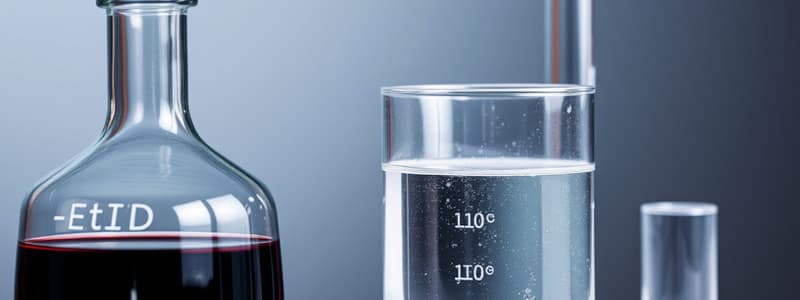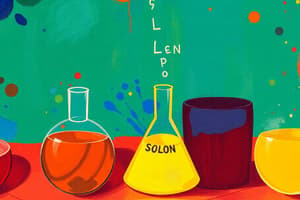Podcast
Questions and Answers
What distinguishes a nonelectrolyte from an electrolyte?
What distinguishes a nonelectrolyte from an electrolyte?
- Nonelectrolytes ionize completely in solution.
- Nonelectrolytes dissolve only in hot solvents.
- Nonelectrolytes conduct electricity.
- Nonelectrolytes do not ionize at all. (correct)
Which factor does NOT affect the rate of dissolving a solute in a solvent?
Which factor does NOT affect the rate of dissolving a solute in a solvent?
- Surface area of the solute
- Nature of the solute (correct)
- Temperature of the solvent
- Agitation of the solution
What is a characteristic of a saturated solution?
What is a characteristic of a saturated solution?
- It dissolves all solute molecules into ions.
- It cannot dissolve any more solute at given conditions. (correct)
- It can dissolve more solute than an unsaturated solution.
- It contains less solute than a supersaturated solution.
Which of the following pairs describes immiscible liquids?
Which of the following pairs describes immiscible liquids?
What is the key difference between molarity and normality in reporting concentration?
What is the key difference between molarity and normality in reporting concentration?
What is the primary function of a solvent in a solution?
What is the primary function of a solvent in a solution?
What does the idiom 'like dissolves like' refer to?
What does the idiom 'like dissolves like' refer to?
What process is referred to when water is the solvent dissolving a solute?
What process is referred to when water is the solvent dissolving a solute?
Which of the following properties must be considered to predict solubility between substances?
Which of the following properties must be considered to predict solubility between substances?
Which type of electrolyte completely dissolves in water to form ions?
Which type of electrolyte completely dissolves in water to form ions?
What is a characteristic of colloids in a solution?
What is a characteristic of colloids in a solution?
What happens to ionic compounds in nonpolar solvents?
What happens to ionic compounds in nonpolar solvents?
What distinguishes a suspension from a solution?
What distinguishes a suspension from a solution?
Flashcards are hidden until you start studying
Study Notes
Solutions
- A solution is a homogeneous mixture of two or more substances in a single phase.
- Solutions consist of a solvent (the dissolving medium) and a solute (the substance being dissolved).
- The solvent is present in a greater amount, while the solute is in a lesser amount.
The Solution Process
- Solute particles disperse throughout the solvent due to intermolecular forces between solute and solvent molecules.
- "Like dissolves like": Solvents interact better with solutes of similar polarity.
- When non-water solvents dissolve solutes, the process is known as solvation (e.g., dissolving plastic in hexane).
- When water is the solvent, the process is referred to as hydration (e.g., dissolving NaCl in water).
- Hydration involves attraction between water molecules and ions: the positive hydrogen attracts Cl-, and the negative oxygen attracts Na+.
Types of Solutions
- Suspensions: Contain particles >1000 nm; particles settle unless stirred.
- Colloids: Contain particles between 1-1000 nm; particles remain suspended in the solvent.
Types of Electrolytes
-
Strong Electrolytes:
- Fully dissociate into ions in water, making a solution a good conductor of electricity.
- Examples include NaCl, CaCl2, and NaNO3.
-
Weak Electrolytes:
- Partially dissociate in water, allowing for limited electrical conductivity.
- Examples include HF and CH3COOH.
-
Nonelectrolytes:
- Do not ionize, dissolve as whole molecules, and do not conduct electricity.
- Example: Sugar (C12H22O11).
Saturated, Unsaturated, and Supersaturated Solutions
- Saturated: Contains the maximum amount of dissolved solute.
- Unsaturated: Contains less solute than its saturation point.
- Supersaturated: Contains more solute than a saturated solution under the same conditions.
Factors Affecting the Solution Process
- Dissolvation Rate: Influences how quickly a solute dissolves.
- Surface Area: Greater surface area increases dissolution rates.
- Solubility: Determines the extent to which a solute can dissolve in a solvent.
- Agitation: Stirring or shaking accelerates solute dissolution.
- Heat (Temperature): Increased temperature often enhances solubility.
Liquid Solutes/Solvents
- Immiscible: Liquid solutes and solvents that do not dissolve in each other (e.g., oil and water).
- Miscible: Liquid solutes and solvents that are soluble in each other (e.g., oil and gasoline).
Units for Expressing Concentration
- Concentration quantifies the amount of solute dissolved in a certain volume of solvent.
- Common units for reporting concentration include:
- Molarity (M)
- Normality (N)
- g/L, mg/L, microgram/L
- w/w%, w/v%, v/v%, ppm, ppb
- Understanding the difference between molarity (M) and normality (N) is essential for precise communication in chemistry.
Studying That Suits You
Use AI to generate personalized quizzes and flashcards to suit your learning preferences.




